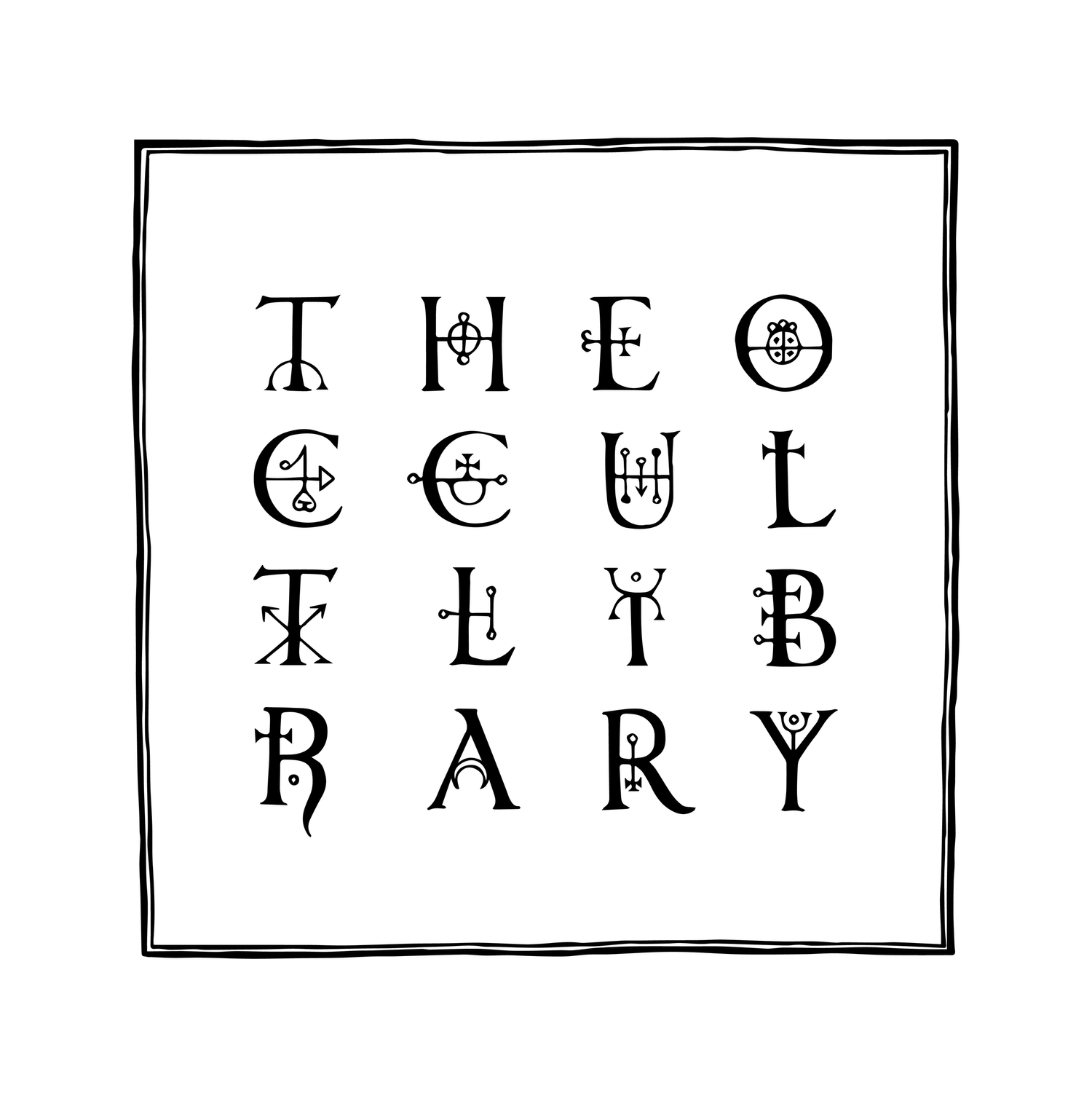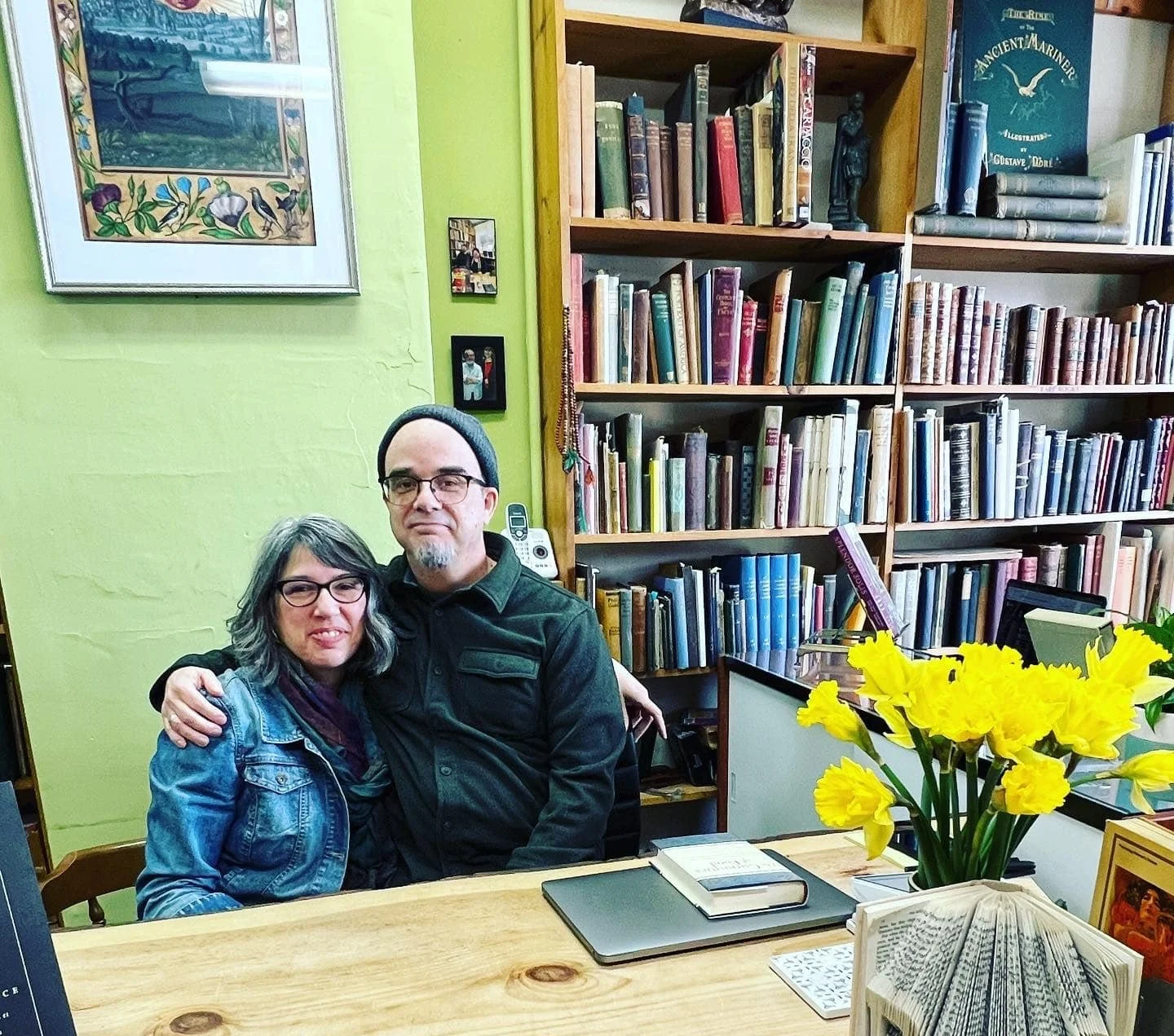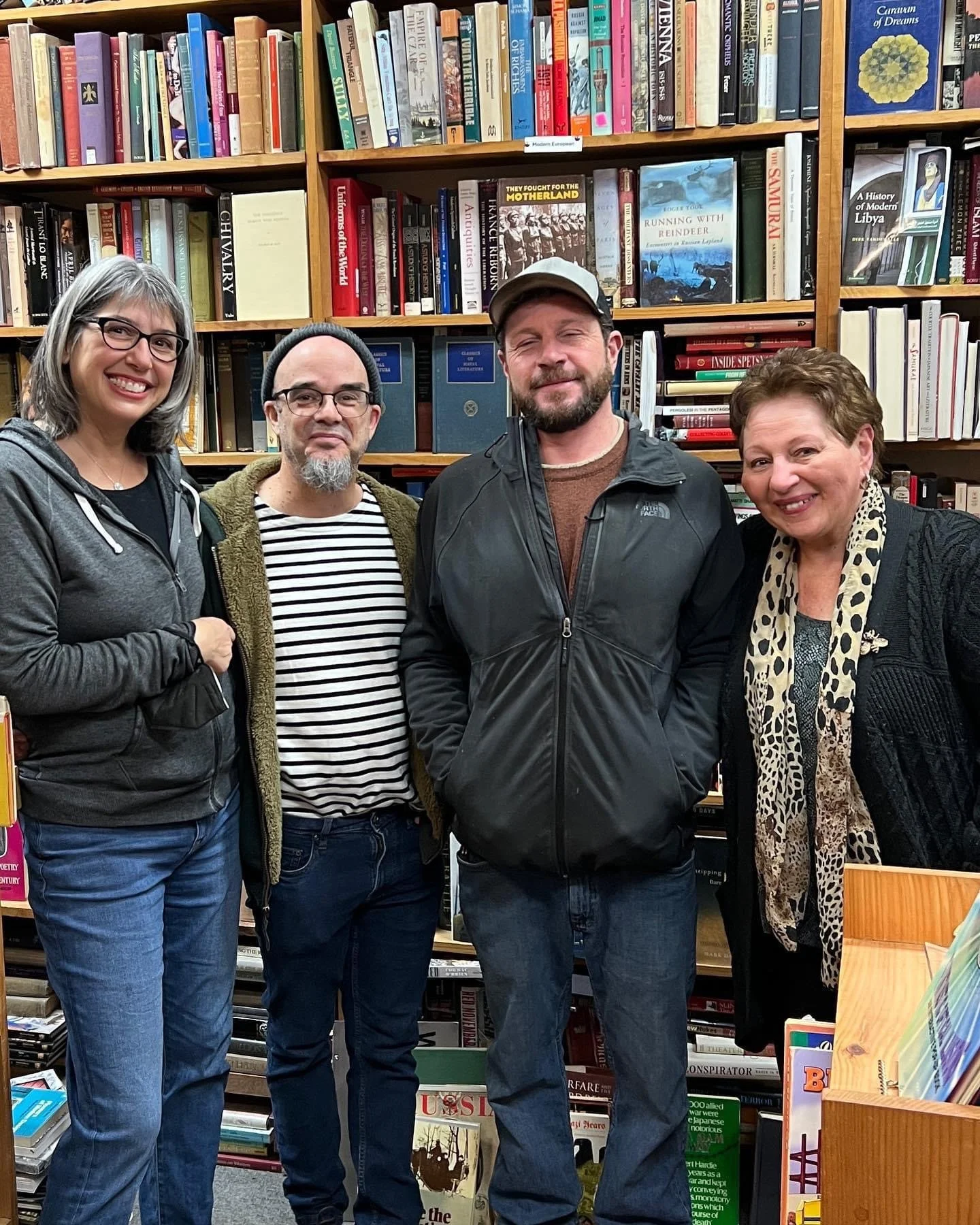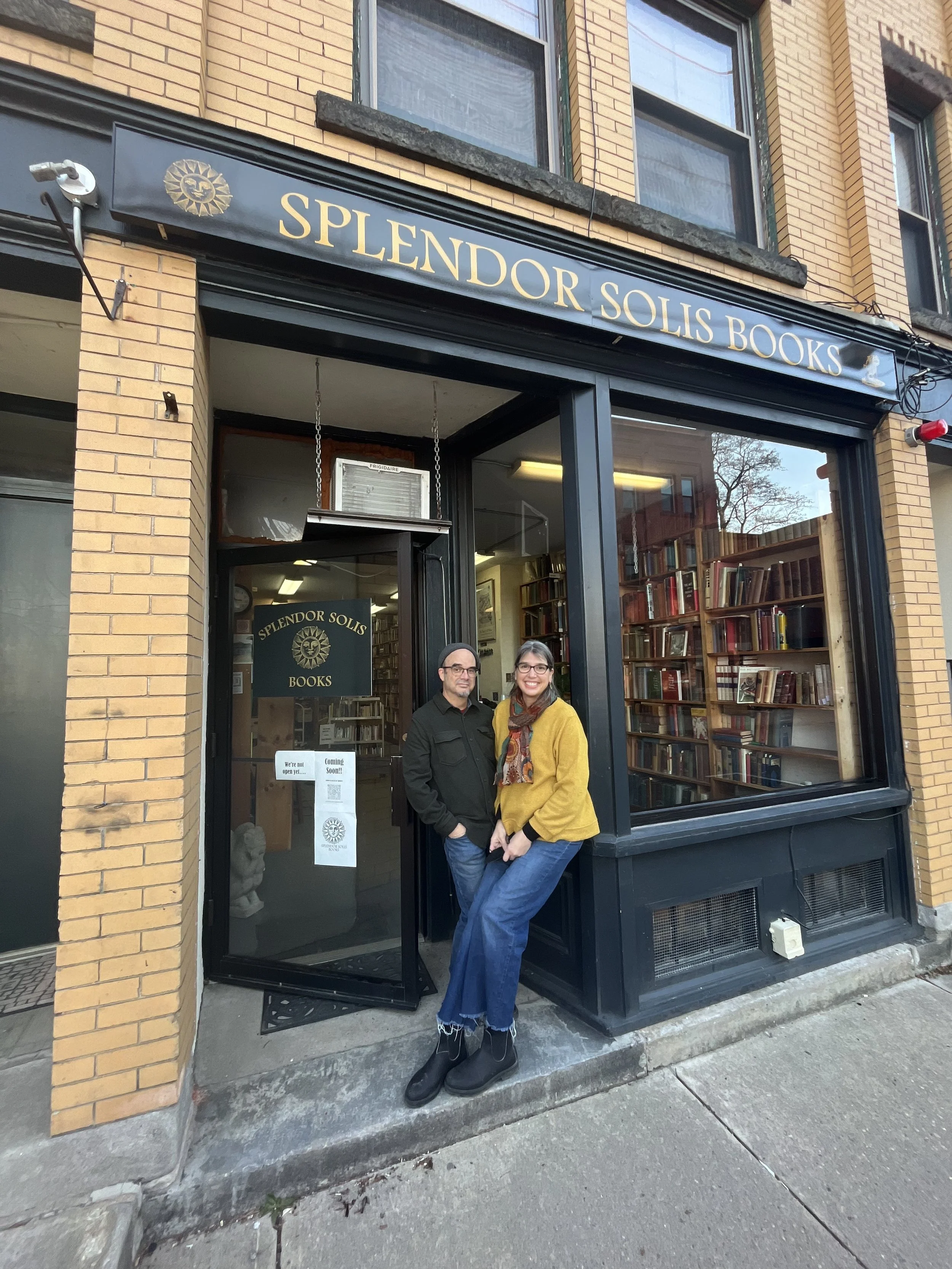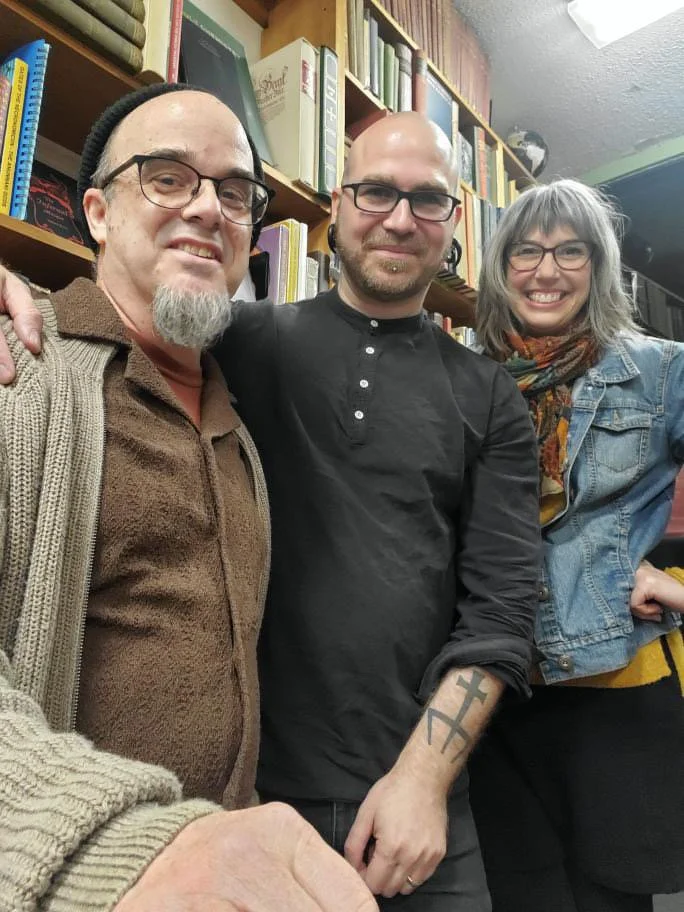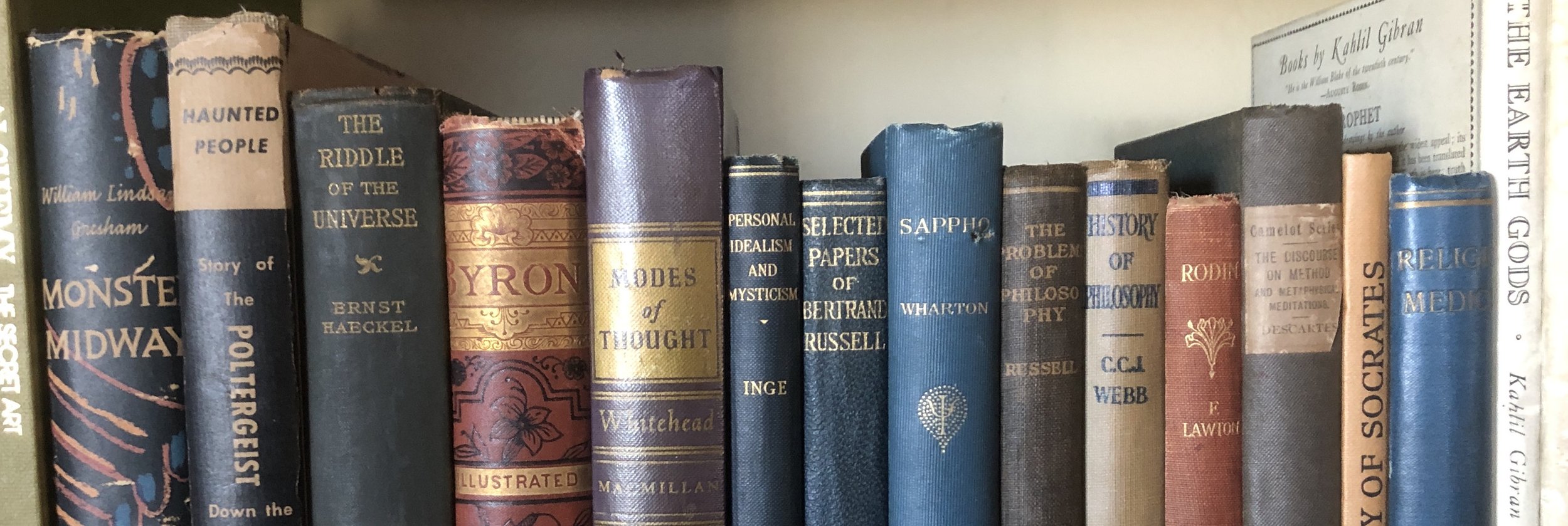In Conversation with Splendor Solis Booksellers
Kevin and Dianne Germain
Splendor Solis Books is a staple of best-loved booksellers within the magical and occult community. With a recently acquired brick-and-mortar shop located in Northampton Massachusetts, Splendor Solis was founded by husband-and-wife duo Kevin and Dianne Germain. Kevin and Dianne emphasize community and connectivity through books, especially in the wake of the earliest pandemic lockdowns. Splendor Solis supports small occult presses by stocking titles from Black Letter Press, Anathema Publishing, Atramentous Press, and more. With a lively social media presence, their offerings are a source of curiosity and wonder for seekers and the well-versed alike.
OL: Welcome Kevin and Dianne. Thank you for taking the time to sit down with us today for this conversation. You have previously mentioned that your earlier days were spent vending around the New England environs. Around what time did your pivot to bookselling and vending occur. What materials served as the ‘seed collection’ for your stock?
SSB: Thank you and it is wonderful to talk together. We are grateful to the Occult Library, it is such a great resource in the esoteric community. It is so valuable to have trusted, credible venues for the occult world.
We have always enjoyed book centric activities, Dianne and I often went on dates to book stores here and there. We particularly enjoyed going to Avenue Victor Hugo when it was in downtown Boston. So this carried over one day when we started noticing we were finding books that had more value than what we were acquiring them for. We started selling a little online, eBay, social media, etc. Lots of others were doing the same, it was becoming a thing to do, certainly. This was before the pandemic.
Because the two of us never do anything half way, we developed a business plan and got intense about it… We started selling at makers markets around New England. One of our favorite events was with the Frankenstein Twins, two amazing artists out of Connecticut. They are the sweetest people.
Seed collection? I think some of our early occult finds were things from C.C. Zain, M.P. Hall, L. W. De Laurence, mostly the early 20th century stuff. You could easily imagine finding these at out of the ways places. Of course we were also sourcing other kinds of books, not just esoteric topics. Science, poetry, literature, art, etc. Anything that struck our fancy. I guess because we had good eye it was fun and easy for us. We always liked the goth aesthetic, so spooky was the word. Lots of Edward Gorey.
All of this was around the time of the pandemic. We started before, but the quarantine forced us to do online selling. We quickly got back to selling in person as soon as things opened up.
A friend of ours connected us with a 30 year old bookstore, Gabriel Books, that was wanting to sell their shop. It was an amazing opportunity, we hadn’t really wanted to be anchored down to a physical location, but the store was in our area and the right size for us. We couldn’t pass it up. Now we own and run a full time business. Sort of unexpected for us, but kind of figures, given our inclination.
Kevin & Dianne with Gabe and Patty from Gabriel Books.
OL: It is well-known that you specialize in books concerned with esoteric & occult currents. You have expressed that this area of interest stems from your voracious reading in childhood. What struck you about this realm of reading material, and how did it carry over into adult life?
SSB: Big Question. I am full on and up front about my guilty pleasures. I was the Black Sabbath nerd who wanted the LOTR to be real. While most of my friends were drinking to the British Invasion, I was lost in my room with all the intensely romantic artists, from the OG goths Shelly, Keats, and Byron; to the magicians, decadents and poets of the 1890s; Ernest Dowson, Crowley, Verlaine, etc. The worlds they painted were places I related to. It was a landscape that felt very near, a place I seemed to be wandering in a portion of the time naturally. Also, being a musician made that interpretation of my experience easier, I think, because I was always hearing things a little differently than those around me. In a general way, of course.
I never really thought about how it carried into my adult life specifically. It seems obvious to say that it informed my approach to life and influenced my choices in activities. I guess I could say my reading reaffirmed my sense of being a stranger to life. A practiced outsider.
OL: The New England region of the United States is well-known for its unique landscape and deep histories of the occult. One must consider the Lovecraftian elements present in the land, but also the horrid yet compelling histories of the witch trials in your state. How did this physical and historical landscape foreground your interests?
SSB: Oh, we love New England. We have been meaning to do a cemetery tour of the area. I feel a deep connection with the early Yankees, I always had an affinity for the Transcendentalists. I think people from New England have a sense of being from somewhere else baked into our sensibility. While we are known for being earthy and grounded, our troubled religious and spiritual history highlights our struggle with dogma and transcendence. With good reason, the racism and bigotry is a factor from those times. But, I often wonder about the more shadowy aspects of our community that isn’t just bound up in treating people as others, rather how we act as if we are going to eventual return to somewhere else, somehow. The Lovecraft aspect is a great observation. WE are the others passing in a world that is really alien in ways we have yet to even imagine.
I guess, to try and answer your question directly; this landscape foregrounded my interest by suggesting the shadowy aspect of otherness. Yes, the horror of it, but also the awe of it. Mainstream religious community worked to make light of it; figuratively and literally. Esoteric interpretations, I feel, give us tools to productively process this experience.
OL: In 2022, you were approached about purchasing the aforementioned brick-and-mortar location, formerly Gabriel Books. In 2023, you established the shop, and we send our congratulations. Despite the bookstore infrastructure that was no doubt present, what challenges arose for you during this process?
Kevin & Dianne in front of their brick-and-mortar shop, formerly Gabriel Books.
SSB: There were piles and piles of books everywhere. In front of other books. Just so. many. books. Uncategorized, just every where. It was great. It was terrible. We realized we had to make wholesale decisions on things in quick fashion. We halved the art category, for example. We talked about getting rid of art books that didn’t have color illustrations. Who wants a Monet in black and white? Of course we made exceptions. We made exceptions all the time, what to keep, what to box, what to get rid of. Our own learned book intuition really held the day. Sorting, making space, and generally making the place our own was a big challenge.
The changes we made were generally met with support and approval. There were some folks who weren’t so pleased with our updates though. A few people preferred the way things were. That was and still is hard to navigate. We inherited a 30 year old shop and are glad to be care takers of it and continue its life in the community.
From an esoteric standpoint I think it might be interesting to your audience to highlight the inner process of how we got here, as there was some ‘occult work’ involved. Both Dianne and I had been deeply involved in the Sufi community for many years, we were very active and did a lot of training in that area, both together and separately. We also had our own personal practices that were and are in a continual state of flux.
Around 2018 I started studying with the Builders of the Adytum, Paul Foster Case’s project. Out of all this work arose the idea of intentionality as a couple and as individuals. We both saw where we were and starting talking about where we wanted to be spiritually, economically and emotionally. We both agreed we wanted to do something together where we could be in the community and make our own decisions. We started to form an image of what that would look like and started making real world changes in that direction. It took time. While we aren’t ceremonialists or spell casters in accepted any sense, we pretty much evoked the situation we find ourselves in today.
While it irks me that it reeks a little of the “manifest your dream’ nonsense; there is a grain of truth to being able to create a vision and meet it. The occult process does indeed work. We did a lot of personal archetypal work that opened us up to what was possible. That is pretty much how I believe the brick and mortar book shop came into being, of course there was real sweat involved. An attentive reader will find images of some of the archetypes hanging around the shop.
Splendor Solis shop iconography.
OL: You maintain a rich and unique social media presence. This is important because your posts have been a source not only of access to specialized books, but also of the sheer discovery of new texts. In a way, your social media posts represent a kind of ‘virtual browsing’ not unlike what we strive to do here at The Occult Library. How do you find that the disembodied nature of digital life lends itself differently to building communities than a brick-and-mortar experience?
SSB: Online life is so tenuous and ephemeral. I have made important connections nonetheless. I am not sure we have quite discovered the full potential and liability for living online so voraciously, either. Without a doubt it is very different. I can’t lie, though, I don’t think a virtual experience is qualitatively preferred to meeting someone face to face.
I think it is harder to build community online, it is not impossible, it just requires a different kind of commitment. I have found the easy nature of the internet is both a benefit and a problem. As just it is easy to jump on a zoom call or write a post to someone it is also very easy to let it all slide away and not connect at all. It is all too easy to “ghost” people. Of course, meeting people in person has its own issues… Its really just a matter of getting used to new mediums and contexts. I think our generation won’t be the one that fully utilizes the capacity of online life.
But, for those who can deftly manage it, it is a pretty effective manner of communicating. I think the Occult Library has has some success here. I think you guys get that it is just a tool. As occultists we are trained to see opportunities and possibilities and not simply pine for some vague notion of a greater past or an unreachable future. It grounds us to say okay, what can I do here with what is presented. We ask questions. And we receive answers!
Now we doing both, we are active online and in person in the community here. Juggling that has its own challenges, time management is a big issue for us. There is just so much that has to be done, and so much that could be done. We get caught up in potentialities vs. actual demands. But, I suppose that is normal life for most business owners.
OL: Speaking of community, you’ve expressed how the collective and individual shock of the pandemic deeply affected your work. For you, books served – and continue to serve – as a potent means of connection during adverse and collectively haunting times. Readers, no doubt felt a refuge in your work during the pandemic, but how did you experience connection from books during the lockdown period of the pandemic?
SSB: Books are great old friends. The system may crash and we’re all locked indoors, but I’ve still got a candle and a good book. Fortunately it wasn’t that bad. To speak to your previous point about online life; the pandemic was bad in a lot of ways, but I can’t imagine how it would have been without the internet. For us, I know it gave us an excuse to stay in and read and study. At the end of the day that’s what we really like.
OL: These days, we are experiencing something of an occult revival regarding the breadth and quality of both secondhand sellers, as well as fine-press publishing houses. How have you been able to build relationships with some of these fine-press publishing houses such as Black letter Press? Have you considered how effectively your own work has been formative to seekers by making them aware of this world?
SSB: That is one of the my favorite highlights of our store. I really love the book art and scholarship that is coming out right now, there is so much great work being done. Claudio at Black Letter Press has really hit on a nice model. Gabriel with Anathema, Peter at Scarlet Imprint, Atramentous Press, they are all doing such amazing things. It is hard to keep up, we are so honored to carry their books. And there others!
Really for us it has been easy in someways, their texts pretty much sell themselves. We just have to bring it around and showcase it, that’s the fun part. We get to talk to the people who are drawn to these kind of ideas. Of course, lots of people don’t know of them. So we try to be the best representatives for their work that we can be.
One of the ways we have found effective in representing these publishers is by drawing some of their prospective authors to give a talk at our shop. Its hard, we have no funding and we’re a very modest little place, but some of the folks we’ve had have been outstanding. We’ve had Kerry Wisner, who is on Troy Books and Shea Bile from Atramentous, for example. They were amazing. We are working on luring a few other people soon, as well. (Hint, hint)
Kevin & Dianne with Atramentous Press author Shea Bilé.
We get folks in all the time that love the titles we carry. We have had great conversations with customers about ideas and occultism. It is indeed one of our very favorite things about being in the community. For me personally, this aspect of bringing this current crop of philosophy to the market is really important. I have often felt that the religious/spiritual/occult conversation has been stilted by dogma and poor thinking. We are in no way esoteric experts, but I like to feel we know authenticity when we see it. Some of the scholarship represented by these publishers, in our opinion, rectifies this problem and is some of the most important work currently being produced today. What a great time to be alive.
OL: On a final note, you have been lucky to have some unique and sought-after titles arrive in your shop. For each of you, what is one book that has been particularly difficult to let go of?
SSB: We had a nice early copy of Sappho poetry, from the late 19th century. I miss that one. We currently have a few titles that I’ll be sad to see go.
Splendor Solis antiquarian titles in-shop.
OL: Kevin and Dianne, we are grateful for your time and thoughtfulness! We wish you all the best in your endeavors in the literary world and look forward to seeing your next updates.
SSB: It has been really great talking with you, thank you for asking such great questions. We hope for all the best for you and yours as well. May we hope for better things for everyone.
